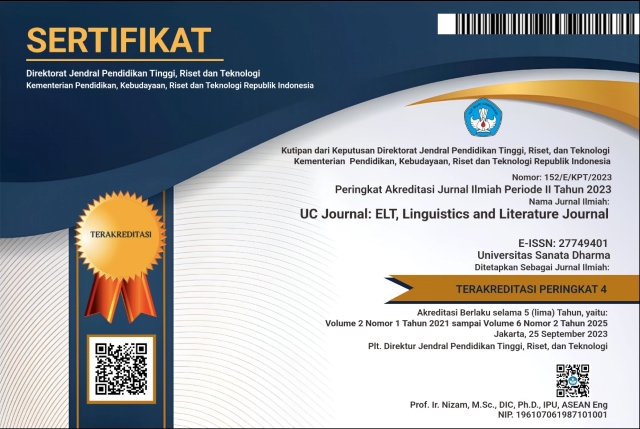THE INVOLVEMENT OF TECHNOLOGY IN ONLINE GRAMMAR LEARNING DURING COVID-19 PANDEMIC
(1) Universitas Indonesia
(*) Corresponding Author
Abstract
Keywords
Full Text:
PDFReferences
Angelova, M., & Zhao, Y. (2016). Using an online collaborative project between American and Chinese students to develop ESL teaching skills, cross-cultural awareness and language skills. Computer Assisted Language Learning, 29(1), 167-185. http://dx.doi.org/10.1080/09588221.2014.907320
Arikan, A. (2014). An examination of online grammar teaching materials available for young learners. Procedia-Social and Behavioral Sciences, 158, 18-22.
Belawati, T. (2019). Pembelajaran online. Jakarta, Universitas Terbuka.
Dhawan, S. (2020). Online learning: A panacea in the time of Covid-19 crisis. Journal of Educational Technology Systems, 49(1), 5-22.
Ekaningsih, N. (2017). Enhancing students’ English grammar ability with online website link. EduLite: Journal of English Education, Literature and Culture, 2(2), 431-444.
Fay, A. D. A., & Matias, J. (2019). Teaching English through youtube: grammar video analysis of three Brazilian youtube channels dedicated to EFL teaching. English Review: Journal of English Education, 8(1), 1. https://doi.org/10.25134/erjee.v8i1.2351
Gain, A., Rao, M., & Bhat, S. K. (2019). Usage of grammarly–online grammar and spelling checker tool at the health sciences Library, Manipal Academy of Higher Education, Manipal: A study. Library Philosophy and Practice, 1-13.
Giatman, M., Siswati, S., & Basri, I. Y. (2020). Online learning quality control in the pandemic Covid-19 era in Indonesia. Journal of Nonformal Education, 6(2), 168-175.
Harun, H., Abdullah, N., & Zainuddin, N. (2018). Enhancing grammar competence using Glow@Cbi (Grammar Online Learning@ Cbi). International Journal of Academic Research in Business and Social Sciences, 8(7), 607-614.
Kementerian Pendidikan dan Kebudayaan Indonesia. (2020). Pembelajaran di masa Covid 19.
Kokkinos, T., Gakis, P., Iordanidou, A., & Tsalidis, C. (2020). Utilising
grammar checking software within the framework of differentiated language teaching. Proceedings of the 2020 9th International Conference on Educational and Information Technology, 234-240.
Kumaravadivelu, B. (2005). Understanding language teaching: From method to postmethod. Routledge.
Margaryan, T. D., & Kalugina, L. V. (2020). Digital transformation of English language teaching (ELT) at a Technical University: BMSTU case study. ITM Web of Conferences, 35, 1-13. https://doi.org/10.1051/itmconf/20203501009
Moore, J. L., Dickson-Deane, C., & Galyen, K. (2011). E-learning, online learning, and distance learning environments: Are they the same?. The Internet and Higher Education, 14(2), 129-135.
Nguyen, T. (2015). The effectiveness of online learning: Beyond no significant difference and future horizons. MERLOT Journal of Online Learning and Teaching, 11(2), 309-319.
Novita, Hartoyo, & Purwanto, B. (2016). The effectiveness of using online newspaper in the learning of grammar: An experimental study at eight grade students of SMP Negeri 8 Batang. In ELT Forum: Journal of English Language Teaching, 5(1), 1-6.
Payne, J. S (2020). Developing L2 productive language skills online and the strategic use of instructional tools. Foreign Language Annals, 53, 243-249. https://doi.org/10.1111/flan.12457.
Perdana, I., & Farida, M. (2019). Online grammar checkers and their use for EFL writing. Journal of English Teaching, Applied Linguistics and Literatures (JETALL), 2(2), 67-76.
Pinto-Llorente, A. M., Sánchez-Gómez, M. C., García-Peñalvo, F. J., & Casillas-Martín, S. (2017). Students’ perceptions and attitudes towards asynchronous technological tools in blended-learning training to improve grammatical competence in English as a second language. Computers in Human Behavior, 72, 632-643.
Purgina, M., Mozgovoy, M., & Blake, J. (2020). WordBricks: Mobile technology and visual grammar formalism for gamification of natural language grammar acquisition. Journal of Educational Computing Research, 58(1), 126–159. https://doi.org/10.1177/0735633119833010
Sadikin, A., & Hamidah, A. (2020). Pembelajaran daring di tengah wabah Covid-19: (online learning in the middle of the Covid-19 pandemic). Biodik, 6(2), 214-224.
Saeedi, Z., & Biri, A. (2016). The application of technology in teaching grammar to EFL learners: The role of animated sitcoms. Teaching English with Technology, 16(2), 18-39.
Sizemore, M. L. (2017). Personalized online learning labs and face-to-face teaching in first-year college English courses. ProQuest LLC.
Szedmina, L., & Pinter, R. (2010). Experiences from using Skype in language teaching. In IEEE 8th International Symposium on Intelligent Systems and Informatics, 449-452.
Snyder, H. (2019). Literature review as a research methodology: An overview and guidelines. Journal of Business Research, 104, 333-339.
Türkmen, Y., & Aydin, S. (2016). The effects of using online concordancers on teaching grammar. Online Submission, 20(1), 145-
Yusof, N. A., & Saadon, N. (2012). The effects of Web-based language learning on University students’ grammar proficiency. Procedia-Social and Behavioral Sciences, 67, 402-408.
DOI: https://doi.org/10.24071/uc.v2i1.3432
Refbacks
- There are currently no refbacks.
Copyright (c) 2021 Robbi Nurdin Hidayat

This work is licensed under a Creative Commons Attribution-ShareAlike 4.0 International License.
UC Journal is indexed in:
UC Journal Sinta 4 Certificate (S4 = Level 4)
We would like to inform you that UC Journal: ELT, Linguistics and Literature Journal, or UC Journal has been nationally accredited Sinta 4 by the Ministry of Education, Culture, Research and Technology of the Republic of Indonesia based on the decree No. Surat Keputusan 152/E/KPT/2023. Validity for 5 years: Vol 2 No 1, 2021 till Vol 6 No 2, 2025
DOI: https://doi.org/10.24071/uc
e-ISSN (validity starting Vol 1, No 2, November 2020): 2774-9401

This work is licensed under CC BY-SA.
Creative Commons Attribution-ShareAlike 4.0 International License
 UC Journal: ELT, Linguistics and Literature Journal, a scientific peer-reviewed journal, was established in 20 May 2020 and is published twice a year, namely in May and November, by the English Language Education Study Programme (S1/Sarjana PBI) in collaboration with the English Education Master's Programme (S2/Magister PBI) of Sanata Dharma University, Yogyakarta, Indonesia.
UC Journal: ELT, Linguistics and Literature Journal, a scientific peer-reviewed journal, was established in 20 May 2020 and is published twice a year, namely in May and November, by the English Language Education Study Programme (S1/Sarjana PBI) in collaboration with the English Education Master's Programme (S2/Magister PBI) of Sanata Dharma University, Yogyakarta, Indonesia.














